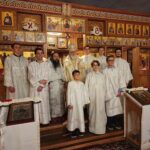All posts by asroc
Basic Etiquette in Orthodox Temples
When it comes to showing respect to God and your brothers, there is no difference between an adult and a child. A child should be trained from his earliest years to be respectful towards other people and especially God. If we shouldn’t begin a conversation with our brother during a service, neither should a child. If we shouldn’t be facing the back of the temple during the service, neither should a child.
We need to understand our place when we come to church and pass that on to our children. Our place is one of coming to the temple to worship God, to repent of our sins, and to reconnect with God’s rhythm, reinvigorating our souls by receiving the sacraments. If we do not teach this to the children they will likely not stay in the Church as they come of age.
- Worshipping is a continuous struggle to hear the words of the services, and taking them into yourself. To engage in venerating what is holy- the icons, relics, and everything blessed.
- Repentance requires a contrite heart, self reflection, and humility
- Reconnecting is bringing our whole being into a heavenly rhythm. We slow our minds down from the speed of the world and dwell on the hymnography and the repeated “Lord have mercy” said throughout the services. When we enter the temple, we are entering an icon of Heaven. The purpose in coming to church is to participate in this icon. From the earliest age, it is of the utmost importance to accustom ourselves to Heaven.
This is the purpose of our coming to church.
Therefore:
- Do not let your children talk during services. If they have something they feel they must say to you, listen, but encourage silence in them.
- Be sure they always face the altar. Whether sitting or standing, our backs should never be to the altar.
- Do not allow them to run at any time, and do not allow them to walk freely. If you want to start training your children to resist their passions, give them a strong sense of barriers. What is allowed and what is not. If you allow too much freedom, this will carry into each year forward. They will develop a sense of looseness and will not gain a sense of what is holy, what is meek and humble. Bring your child’s focus to what your focus should be on: worship. Worship for a child early on does not include comprehending the words in the prayers, but it does include standing respectfully, looking forward towards the altar, bowing to the bishop when he blesses, bowing to the censer when censed. Simply being quiet. Teach your child to worship in these bodily ways to start. And as they develop intellectually, to listen to the words being sung and read.
- Do not allow continuous noise. If the child is acting up, take him out of church to deal with him and bring him back when he’s calmed down. It doesn’t do you or him and especially anyone else any good to deal with a child who is being loud or making noises that distract from the point.
- There should be no toys in general, but perhaps something for very young children if it is simply for them to hold onto (a doll or stuffed animal). Sometimes children see their favorite doll as their friend- so its not quite a toy at this point. Books for children do not be belong in the temple or anything else that distracts them from participation in the service.
- No laying down whatsoever (besides a sleeping baby).
- Don’t let children take bread or wine after their post communion bread and wine. It is not the time right after communion to stuff our bellies. The bread and wine following communion are there to help wash the Body and Blood down only. Then what follows are more petitions of prayer and before we depart, particular prayers of giving thanks to the Lord for allowing us to take His Body into us.
- Let us not allow our children to act like pigs. I mean that in a spiritual sense as well as physically. Spiritually, a pig is one who doesn’t reverence or regard what is before him. We need to teach our children the discipline of commanding our bellies. First prayer, then food. After receiving the Body and Blood of Christ, thanksgiving. Teach them that what they just received is holy.
Always stand and have your children stand during the gospel reading, the cherubic hymn and great entrance, the creed, the consecration, and the Our Father. Unless a health reason makes this too difficult.
In the course of teaching a child, it is necessary to take him out of church at times that he crosses certain lines. It is for you to enforce the rules mentioned. If a child will not quiet himself and be respectful after a reasonable amount of time, then he will need to be taken out. One way to make the child see this as something less desirable than staying in church is to take the child somewhere (could be the car if its not scorching hot) or a room where the child is forced to sit on your lap and not play with anything. If the child has been acting up, likely he won’t want to calmly sit on your lap to relax. If he is willing to sit calmly, then that can be done in the service. If he is acting up, force the child to sit this way outside church until he calms down and then bring him back to church. If he picks it back up, its back to the lap outside church. This has been an effective tool for my wife to enforce the rules.
Another tool is spanking. Often, it can be enough to tell the child if he must be taken out, he will receive a spank. The effectiveness can vary with the particular child.
One tool is to give the child a break outside church where you take him on a short walk or allow him to get energy out some other way. The key with this tool is that it is short and under your control. It is a pastoral decision on the parents part whether the child just needs some time to have a break from the work of worshipping. But don’t make it a playing break. It should be like giving a little something before a meal to a little child that doesn’t spoil his appetite, but just gets him by when he is very hungry. Giving the child a playing break is like giving him a bag of candy before or during the meal. This just makes it more difficult to come back to the meal (the service).
You may need to give up a lot of your own attention to the service in order to teach your children, but God will bless you abundantly for this good work and it is only for a time. It is necessary at this stage in life to make that sacrifice. God willing, all that work will show fruit as the child grows into a more beautiful person and you will also have grown from the exercise of teaching and guiding your children. By striving to help your child understand life, you will come into a better understanding as well.
The earlier you start teaching this discipline to your child, the easier it will be later on. Over time, the child grows accustomed to the discipline of prayer and worship and it will be just a matter of habit to be mindful of the service, and respectful. Your child will with God’s grace engage on his own because engaging is now just his habit in church.
A tool to engage older children is spending time teaching about the symbology in the services. Discussing where various hymns we sing come from. What are the epistles? What are the gospels? These things can be learned in Sunday school or at home. What are the seasons of the Church? The rhythm of passing from fasting periods to feasts. And reading lives of saints should absolutely not be neglected. By hearing about the life of a saint, we hear how someone who was oriented towards Heaven lived. The more examples we hear, the better understanding we have for how our own life should be ordered.
Modesty – Some basics
No pants for girls or women.
Skirts/ dresses should never be above knee length. Slits also should never go above knee.
No sleeveless blouses or dresses, no low fronts or backs.
It should not be possible to see underclothing
After all these other things, make sure you wear a head covering, including little girls.
Don’t wear clothing with wording or logos. Do not distract your brothers. Wear clothing that shows you revere the Lord as your king and want to pay him honor.
Men should always wear pants and they should be moderately loose, not tight against the skin. The shirts should be collared and also not tight against the skin.
NO LIPSTICK





















































